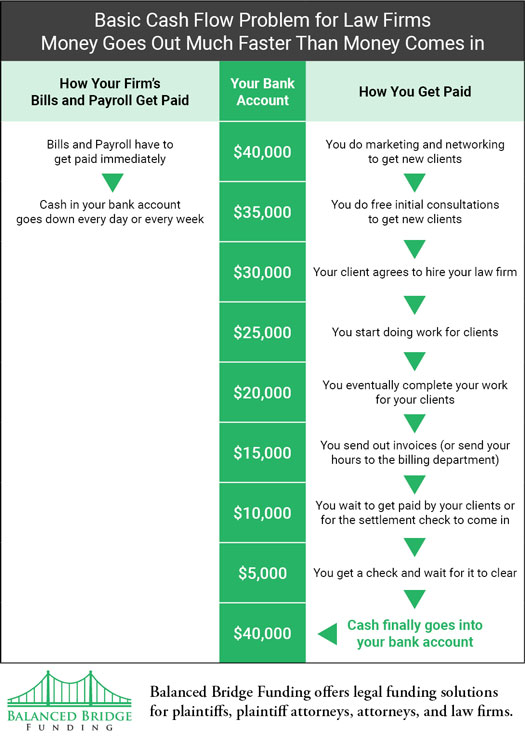Cash Flow 101 for Law Firms – How to Manage Cash Flow for Law Firms
What is Cash Flow
Cash Flow 101 for Law Firms: Before we start talking about managing cash flow for law firms, let’s first talk about what cash flow is and why it matters. Cash flow is the term used to describe the flow of cash coming into your business bank account and the cash flowing. That is what cash flow is – the flow of money in and out of your company.
So when you are talking about managing cash flow for your law firm, you are talking about managing how you get cash into your bank account and managing how much (and how fast) cash leaves your law firm bank account.
Why Cash Flow for Law Firms Matters
When you are out of cash, you are out of the game. Period!
Businesses do not close because of profit, or lack of it. Businesses close because they can no longer pay their bills or pay payroll. As long as there is sufficient cash in your account to pay your people and your vendors, you remain in the game.
If you think this isn’t true, just think about Uber or Amazon.com. Amazon didn’t post a profit for almost twenty years and not only stayed in business but became one of the largest companies in the world. Everyone with an internet connection has heard of Amazon.

Uber hasn’t turned a profit yet. And who knows if they ever will. And the truth is, they don’t need to. They have cash pouring into their bank account every minute of every day around the world. They will never run out of cash, so they will never go out of business.
How do these companies that never turn a profit thrive – because they have MASSIVE amounts of cash coming into their bank account every second of every day. Their cash account will never be empty. Their expenses might go up or down, but they will always have cash in their business to pay bills.
So remember the only thing that matters is cash in the bank every day.
Why do Law Firms Struggle with Cash Flow?
To understand why law firms struggle with cash flow, you need to understand how cash comes into your law firm, and how it goes out. The main problem law firms have with cash flows is caused by timing (which is true for lots of different companies).
Here is an Example of What We Mean by Timing of Cash Flows
When do you have to pay your employees? Probably every week or every other week, right? So every week or every other week, cash leaves your bank account to pay employees. They want their money now, and you have to pay them immediately. You have cash going out of your business almost every day for one expense or another.
But does cash come INTO your bank account every day, every week, or every other week as a lawyer?
For most law firms, the answer is no, it doesn’t.
In fact, how long does it take for you to get paid for your services? If you are a plaintiff attorney it might take years or even a decade to get paid for your work. A law firm specializing in estate planning may only bill their clients monthly – but often they give them thirty days to pay, and in some cases, the client might not pay for sixty or ninety days.
This is the problem with the timing of cash flows: You have to pay your bills NOW – but you don’t get paid for your work until later. Sometimes much later.
Infographic: The Timing of Cash Flows Problem

This creates a real problem for lots of companies, but law firms are particularly susceptible to cash flow problems because they are so expensive to operate, and it often takes a long time to actually receive your money from your clients or from a settlement award. Your money is simply flowing out at more regular intervals than it comes in which leaves the law firm struggling to “finance the wait.”
Problems Lack of Cash Flow Creates in Law Firms
Paying Your Bills and Employees
This is the most obvious problem a lack of cash flow creates for law firms. If you can’t make payroll, you are in trouble. If you can’t pay your bills, those vendors discontinue services, which limits your ability to operate (and damages your company’s credit).
Growth
The less obvious problem lack of cash flow creates is that it forever limits your growth both in the short term and in the long term.
In the short term, if you can’t pay your employees, they will leave, which means whatever they were doing, you now have to do yourself. And while you are doing that, you are not networking, marketing, doing work you can bill for, or seeking new opportunities for growth. And although this is uncomfortable, lots of small law firms stay stuck in this forever. They always struggle with cash flows and they never grow. They hire new employees and lay them off when times get tough, which has the net effect of making sure times will always be tough.
In the long term, if your cash account is short, how much risk are you going to take on new opportunities? How many new opportunities might come your way you simply can’t engage with because you know you don’t have enough money to sustain yourself while a big class action lawsuit plays out? Or you don’t take a case because you aren’t 100% certain you can win? Or you don’t take a case because you know you can’t afford to “do it right” and hire the right experts or consultants or labs to help you win?
How much marketing are you going to do when you are struggling to make payroll? Probably not much. And marketing is risky – a lot of marketing doesn’t pay off or doesn’t pay off immediately. Law firms that struggle with cash flow don’t do much marketing. They can’t afford to take the risk. And just like payroll, most marketing companies want their money upfront, and then they go to work on your marketing, and then the marketing finally gets out there, but you might not see a return on that investment for a few months. This can create additional cash flow problems.
How Law Firms Finance Operations (Cash Flow)
Law firms finance operations much the same way that any small business does; they use personal savings, 401k’s, personal credit cards, small business loans, loans from family and friends, lines of credit (if they are very lucky), and law firm funding options from law firm financing companies like Balanced Bridge Funding.
Large law firms often finance their operations through lines of credit, but more and more we are now seeing large law firms who are backed financially by hedge funds, insurers, and other large financial institutions. They borrow other people’s money to finance their day-to-day operations and growth and pay a small percentage in fees to do it.
Debt Free is Not a Good Business Goal
Show me a business that is debt free and I will show you a company that is asleep at the wheel. Financiers all know this is true. Although being debt free on a personal level may be a worthy goal, it is not good to be debt free as a company.
Why? Because to be debt free as a company almost always means that you are not:
- Investing in Growth
- Investing in New Technology
- Investing in New Talent
- Investing in New Markets
- Taking Long Term Risk
- Trying to Stay Ahead of The Pack
Why is this the case? Because if you were investing in the latest technology, and new talent, and new markets, and taking long term risk to grow, there is no way you would be free of debt, and finance people know this.
If you’ve seen the movie “Barbarians at the Gate” – you’ve seen this at work. Corporate take-over specialists are always looking for companies with long-term growth potential and no debt. Why are they looking for companies with low or no debt? Because they know they are not trying to grow. They buy these companies and borrow against their equity (pile on debt) to finance growth, which increases the value of the company and enhances the investor’s balance sheet.
And when they can’t do that – they dismantle these companies and sell them off piece by piece to the highest bidder and they make money that way.
Our point in all of this is to make sure you understand that being debt free as a law firm is not a good goal to have unless your goal is to stay small, and have a business that just supports your lifestyle but never really goes anywhere.
You see, finance companies know that to truly grow and prosper as a business, you are going to have to use other people’s money. Very few companies have ever found a way around this.
And beyond that, if you are a business owner who won’t take on debt to grow your company, but one of your competitors does go out and secure financing to fuel growth, you are going to get left behind. They are going to continue growing, continue taking market share, and continue building their company brand name, and you are going to muddle along and never really go very far as a business.
Controlling Fixed Costs (Expenses)
A big part of managing cash flow for any company begins with controlling your fixed costs.
To begin understanding fixed costs, it is important that you understand the difference between fixed costs and variable costs.
Fixed costs are essentially overhead. These are bills you have to pay regardless of whether you make any money or not. You still have to pay them. They are FIXED. You have to pay them no matter what.
As far as accounting goes, on your income statement, you will always see payroll listed as a variable cost, just because “that’s the way accounting does it.” But the fact is, payroll is rarely variable. If you have employees you have to keep paying them whether you are doing well or not.
You MUST control fixed costs.
Why? Because these are activities that east up cash immediately, and you don’t get paid immediately.
Fixed costs include everything you have a monthly bill for.
But the main two overhead costs you need to control to make sure you survive are rent and payroll.
In most businesses, payroll and rent will take up to 50% of every dollar you make. Therefore, you need to pay close attention to them, especially when you are just starting out in business.
Too many times new business owners have taken on a huge monthly expense to pay for a space they think will “impress” clients. You want to know what will impress your clients – win for them. Advocate for them. Show up on time, and answer your emails and voicemail messages. Your fancy office with all of those old dusty law books aren’t impressing anyone anymore.
Plus – if you are a new attorney, why take on rent at all? There are lots of good shared working spaces and answering services you can use to your advantage. Remember – the less money you have to put out every month, the easier it is to stay afloat during lean times.
Payroll – you need to control payroll. Especially when you are just starting out. You can make good use of outsourced services of all kinds now. Personal assistants, virtual personal assistants, virtual paralegals, part-time help, etc. You can find an outsourced service for just about everything now. Take advantage of them. Payroll often accounts for 25% to 35% of every dollar you make. Keep your payroll under a watchful eye. It can creep up quickly.
Factor Your Receivables (Money People Owe You)
Today, even large law firms are taking advantage of law firm financing options like factoring. Companies that provide these options are variously known as legal funding, lawsuit funding, settlement advances, law firm factoring, law firm finance companies, etc.
How Legal Funding Companies Work
Remember the basic law firm cash flow problem? Money goes out fast and comes in slow?
One of the ways law firms can manage their cash flow is by using legal funding solutions to factor their receivables or settlements. Here is how it works:
When you win a case, or have billed a client, and are waiting to be paid from either the lawsuit or the client, you can “sell” all or a portion of the money that is owed to you to a legal funding company like Balanced Bridge Funding.
You sell us the money you are owed, and now we own it, and when the bill is paid, we get paid. We give you your money right away (for a fee), and when the client pays or the lawsuit settlement pays, we get paid.
It is as simple as that. You get your money now, and we get paid to do the waiting for you.
Factoring Receivables
This type of transaction historically was known as factoring. And most industries take advantage of using factoring companies to help solve their cash flow challenges. Even large law firms use factoring companies to factor their receivables and keep cash in the cash account to finance the long term growth of their business.
Why Legal Funding Instead of a Traditional Line of Credit
We get this question a lot, and there are lots of good reasons to use law firm funding instead of a traditional line of credit. One, a line of credit assumes you can get a line of credit. Two, a line of credit is fixed, meaning if you have a huge case come in, you cannot easily just bump up your line of credit to accommodate new caseloads. It is fixed. Three, legal funding is not a loan, so it is not based on your credit, nor does it impact your credit score because you are not applying for, or taking out a loan. Four, the more you borrow, the less you are able to borrow. This is called your debt-to-equity ratio. But the bottom line is, the more you have already borrowed, the less banks will loan you in the future.
But with legal funding, there is ultimate flexibility. You can factor only what you need.
Variable Cost – Unlike a loan that has to be paid back every month (which reduces cash in the bank), you don’t pay us back for legal funding. The case or the client pays us. And, it is truly variable cost because you are only using legal funding when you have a caseload. If things slow down, you factor less, and there is less expense.
Summary Cash Flow 101 for Law Firms
Cash flow is always going to be something law firms must manage. Payroll and bills require cash today, but you don’t get paid right away for the work you do, so you’ve got more money going out than you have coming in. This is a cash flow problem.
To manage this, you can take on debt, use legal funding companies like Balanced Bridge Funding, keep rent and payroll to a minimum the best you can, and keep your bills as tight as possible.
About the Authors:
Balanced Bridge Funding offers legal funding solutions for plaintiffs, plaintiff attorneys, attorneys, and law firms. To talk to one of our legal funding specialists about getting help managing your law firm cash flow, please call (267) 457-4540 or email: info@balancedbridge.com


